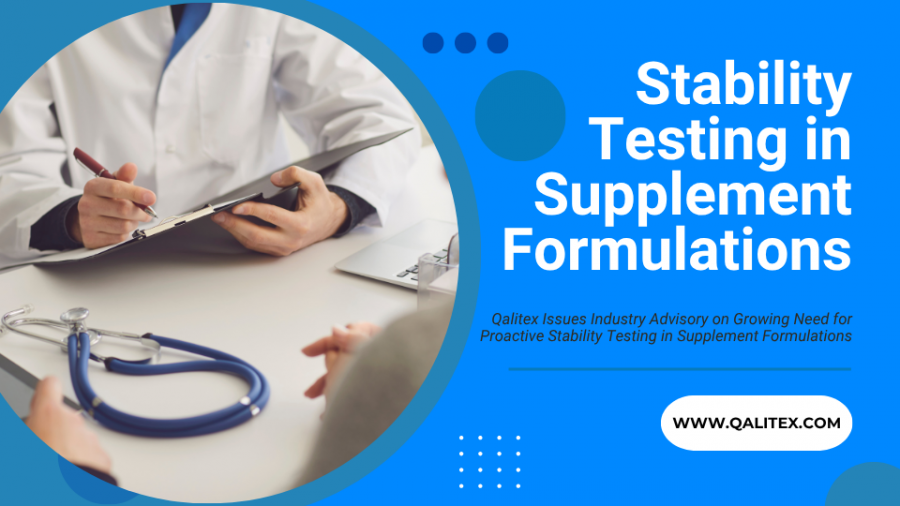
Qalitex Issues Industry Advisory on Growing Need for Proactive Stability Testing in Supplement Formulations
Qalitex Labs releases industry advisory urging supplement brands to adopt proactive stability testing as global regulations and marketplace standards tighten.
IRVINE, CA, UNITED STATES, June 11, 2025 /EINPresswire.com/ -- Qalitex Laboratories, a provider of advanced product testing and compliance services, has issued an industry advisory addressing the growing urgency for proactive stability testing in supplement formulations. As regulatory expectations evolve and e-commerce platforms tighten compliance requirements, stability testing has emerged as a critical component of product safety and market access.
WHY STABILITY TESTING IS BECOMING A CENTRAL REGULATORY FOCUS
Stability testing determines how a product maintains its safety, quality, and efficacy over time under various storage conditions. In recent years, regulatory agencies such as the U.S. Food and Drug Administration (FDA), Federal Trade Commission (FTC), and global counterparts have increasingly scrutinized stability claims on dietary supplements, cosmetics, and personal care products.
Beyond government oversight, online marketplaces like Amazon and Walmart have adopted stricter documentation policies to ensure that products listed on their platforms meet accurate shelf-life standards. As global supply chains expand and distribution crosses multiple climate zones, ensuring product stability across all conditions has become both a regulatory and operational challenge.
HOW STABILITY FAILURES IMPACT PRODUCT VIABILITY
Stability failures can have far-reaching consequences. Chemical degradation may reduce the potency of active ingredients, while physical instability can lead to contamination, discoloration, clumping, or separation of ingredients. Improper packaging and storage exacerbate these risks, potentially compromising product safety and effectiveness.
For manufacturers and brands, such failures can result in costly product recalls, damage to consumer trust, regulatory sanctions, and de-listing from major online platforms. Maintaining robust stability profiles is now a fundamental part of overall product safety and long-term business sustainability.
WHEN STABILITY TESTING SHOULD BE CONDUCTED IN THE PRODUCT LIFECYCLE
Qalitex emphasizes that stability testing should be integrated throughout the product development and distribution process. Early-phase formulation testing helps identify potential stability risks before products reach scale. Pre-market studies establish scientifically supported shelf-life claims so products meet label declarations when they reach consumers.
Ongoing stability monitoring, conducted post-market, verifies that products continue to meet safety and quality standards throughout their commercial lifespan. Periodic testing aligns with Good Manufacturing Practices (GMP) and satisfies increasing regulatory expectations for continuous quality oversight.
REAL-TIME VS. ACCELERATED STABILITY TESTING EXPLAINED
Real-time stability testing evaluates products under normal storage conditions over their intended shelf life, offering the most definitive data on long-term stability. However, accelerated stability testing exposes products to elevated temperatures and humidity levels, generating predictive data within a shorter timeframe.
Accelerated testing is commonly used to establish preliminary shelf-life claims while real-time studies are underway. Many regulatory bodies accept accelerated testing results when supported by sound scientific rationale, though real-time data remains the gold standard for full compliance documentation.
STABILITY TESTING FOR INTERNATIONAL MARKET COMPLIANCE
Exporting products globally introduces additional stability challenges. Each country may impose distinct requirements for stability data, creating complexities for companies operating in multiple jurisdictions. The FDA, European Food Safety Authority (EFSA), Health Canada, ASEAN nations, and Gulf Cooperation Council (GCC) markets all maintain separate expectations.
Proactive stability testing helps streamline international registrations, minimizes the risk of customs holds or product rejections, and facilitates smoother entry into regulated markets. As international demand for dietary supplements and personal care products grows, stability data has become indispensable for global market expansion.
HOW STABILITY TESTING SUPPORTS AMAZON AND E-COMMERCE PLATFORM COMPLIANCE
Online marketplaces are increasingly enforcing documentation standards that include validated stability testing data. Amazon, for example, requires comprehensive safety files for dietary supplements, which often include stability reports as part of their compliance verification process.
Third-party stability reports play a key role in platform investigations, product listing approvals, and ongoing compliance reviews. Sellers lacking proper stability documentation risk sudden product removals, account suspensions, and irreversible platform penalties.
THE COST OF STABILITY TESTING NON-COMPLIANCE
Neglecting stability testing can carry significant financial and legal consequences. Products may face recalls, forced destruction of non-compliant inventory, and substantial revenue losses. Legal liabilities may arise if unsubstantiated shelf-life claims lead to regulatory investigations or consumer complaints.
Brand reputation can suffer long-term damage when safety concerns emerge, eroding consumer trust and resulting in negative media attention. Compared to the relatively modest investment in comprehensive stability testing, the costs of non-compliance are exponentially higher.
QALITEX’S ADVISORY RECOMMENDATIONS FOR BRANDS AND MANUFACTURERS
As part of its advisory, Qalitex recommends that brands and manufacturers:
Integrate stability testing at every stage of product development and commercialization.
Utilize both real-time and accelerated studies for comprehensive data coverage.
Maintain complete and accessible documentation to support audits and regulatory inquiries.
Align label claims strictly with validated stability data.
Partner with qualified third-party laboratories for objective, scientifically sound testing.
A PROACTIVE APPROACH TO STABILITY TESTING IS NOW A BUSINESS IMPERATIVE
“Stability testing is no longer a peripheral consideration. It’s central to regulatory compliance, consumer safety, and brand protection,” said a Qalitex spokesperson. “Our advisory reflects the growing industry need for proactive stability programs that keep pace with today’s heightened oversight and marketplace expectations.”
With this advisory, Qalitex reaffirms its commitment to supporting brands in navigating evolving compliance landscapes while safeguarding product integrity across global markets.
Nour Abochama
Qalitex Laboratories
email us here
Visit us on social media:
LinkedIn
Instagram
Facebook
Distribution channels: Beauty & Hair Care, Business & Economy, Chemical Industry, Healthcare & Pharmaceuticals Industry, Sports, Fitness & Recreation
Legal Disclaimer:
EIN Presswire provides this news content "as is" without warranty of any kind. We do not accept any responsibility or liability for the accuracy, content, images, videos, licenses, completeness, legality, or reliability of the information contained in this article. If you have any complaints or copyright issues related to this article, kindly contact the author above.
Submit your press release

